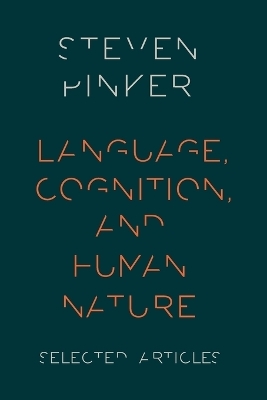
Language, Cognition, and Human Nature
Oxford University Press Inc (Verlag)
978-0-19-025928-0 (ISBN)
Language, Cognition, and Human Nature collects together for the first time much of Steven Pinker's most influential scholarly work on language and cognition. Pinker's seminal research explores the workings of language and its connections to cognition, perception, social relationships, child development, human evolution, and theories of human nature.
This eclectic collection spans Pinker's thirty-year career, exploring his favorite themes in greater depth and scientific detail. It includes thirteen of Pinker's classic articles, ranging over topics such as language development in children, mental imagery, the recognition of shapes, the computational architecture of the mind, the meaning and uses of verbs, the evolution of language and cognition, the nature-nurture debate, and the logic of innuendo and euphemism. Each outlines a major theory or takes up an argument with another prominent scholar, such as Stephen Jay Gould, Noam Chomsky, or Richard Dawkins. Featuring a new introduction by Pinker that discusses his books and scholarly work, this collection reflects essential contributions to cognitive science by one of our leading thinkers and public intellectuals.
Steven Pinker is Johnstone Family Professor in the Department of Psychology at Harvard University. He conducts research on language and cognition, writes for publications such as the New York Times, Time and The New Republic, and is the author of eight books, including The Language Instinct, How the Mind Works, Words and Rules, The Blank Slate, The Stuff of Thought, and, most recently, The Better Angels of Our Nature: Why Violence Has Declined.
Introduction ; 1. Formal models of language learning ; 2. A computational theory of the mental imagery medium ; 3. Rules and connections in human language ; 4. When does human object recognition use a viewer-centered reference frame? ; 5. Natural language and natural selection ; 6. The acquisition of argument structure ; 7. The nature of human concepts: evidence from an unusual source ; 8. Why nature and nurture won't go away ; 9. The faculty of language: What's special about it? ; 10. So how does the mind work? ; 11. Deep commonalities between life and mind ; 12. Rationales for indirect speech: The theory of the strategic speaker ; 13. The cognitive niche: Coevolution of intelligence, sociality, and language ; Author Biography
| Erscheint lt. Verlag | 10.12.2015 |
|---|---|
| Zusatzinfo | 23 b&w illustrations |
| Verlagsort | New York |
| Sprache | englisch |
| Maße | 155 x 231 mm |
| Gewicht | 590 g |
| Themenwelt | Geisteswissenschaften ► Philosophie ► Sprachphilosophie |
| Geisteswissenschaften ► Psychologie ► Verhaltenstherapie | |
| Geisteswissenschaften ► Sprach- / Literaturwissenschaft ► Sprachwissenschaft | |
| ISBN-10 | 0-19-025928-0 / 0190259280 |
| ISBN-13 | 978-0-19-025928-0 / 9780190259280 |
| Zustand | Neuware |
| Informationen gemäß Produktsicherheitsverordnung (GPSR) | |
| Haben Sie eine Frage zum Produkt? |
aus dem Bereich


